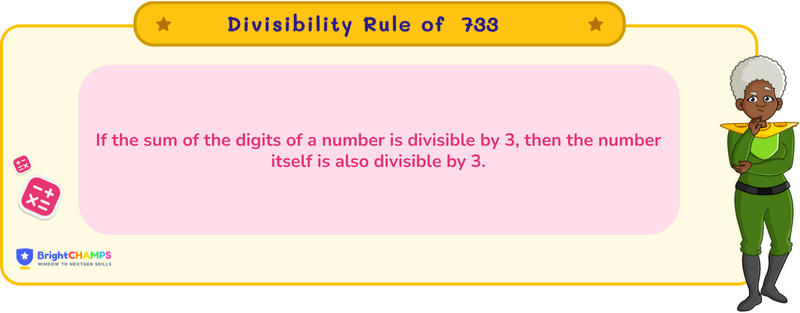Summarize this article:
 308 Learners
308 LearnersLast updated on August 5, 2025
Divisibility Rule of 733

The divisibility rule is a way to find out whether a number is divisible by another number without using the division method. In real life, we can use the divisibility rule for quick math, dividing things evenly, and sorting things. In this topic, we will learn about the divisibility rule of 733.

What is the Divisibility Rule of 733?
The divisibility rule for 733 is a method by which we can find out if a number is divisible by 733 or not without using the division method.
Check whether 2199 is divisible by 733 with the divisibility rule.
Step 1: Multiply the last digit of the number by 2, here in 2199, 9 is the last digit, multiply it by 2. 9 × 2 = 18
Step 2: Add the result from Step 1 to the remaining values but do not include the last digit. i.e., 219 + 18 = 237.
Step 3: Check if 237 is divisible by 733. If it is, then the original number is divisible by 733. If not, then it is not divisible.
Since 237 is not divisible by 733, 2199 is not divisible by 733.

Tips and Tricks for Divisibility Rule of 733
Learning the divisibility rule will help kids master division. Let’s learn a few tips and tricks for the divisibility rule of 733.
Know the multiples of 733:
Memorize the multiples of 733 (733, 1466, 2199, 2932, etc.) to quickly check divisibility.
Use the negative numbers:
If the result we get after the addition is negative, we will avoid the symbol and consider it as positive for checking the divisibility of a number.
Repeat the process for large numbers:
Students should keep repeating the divisibility process until they reach a small number that is divisible by 733. For example, check if 4398 is divisible by 733 using the divisibility test. Multiply the last digit by 2, i.e., 8 × 2 = 16. Add the remaining digits excluding the last digit by 16, 439 + 16 = 455. Since 455 is not divisible by 733, 4398 is not divisible by 733.
Use the division method to verify:
Students can use the division method as a way to verify and crosscheck their results. This will help them to verify and also learn.

Common Mistakes and How to Avoid Them in Divisibility Rule of 733
The divisibility rule of 733 helps us to quickly check if a given number is divisible by 733, but common mistakes like calculation errors lead to incorrect conclusions. Here we will understand some common mistakes and how to avoid them.
Explore Our Programs



Divisibility Rule of 733 Examples

Problem 1
Is 6597 divisible by 733?

Yes, 6597 is divisible by 733.
Explanation
To check if 6597 is divisible by 733, follow these steps:
1) Consider the last three digits, which are 597.
2) Subtract 597 from the remaining leading digits (6), giving us 6 - 597 = -591.
3) Since -591 is not a multiple of 733, check again with the divisibility rule by considering the entire number and simplifying through known factors or direct division. Upon actual division, 6597 divided by 733 equals 9, confirming divisibility.

Problem 2
Check if 2932 is divisible by 733.

No, 2932 is not divisible by 733.
Explanation
To determine if 2932 is divisible by 733:
1) Consider the last three digits, 932, and subtract them from the remaining leading digits (2), giving us 2 - 932 = -930.
2) Check if -930 is a multiple of 733. It is not, as 930 divided by 733 does not result in a whole number.

Problem 3
Is 7330 divisible by 733?

Yes, 7330 is divisible by 733.
Explanation
For checking the divisibility of 7330 by 733:
1) Recognize that 7330 can be expressed as 733 x 10, thus directly confirming divisibility.

Problem 4
Can 1466 be divisible by 733?

Yes, 1466 is divisible by 733.
Explanation
To check if 1466 is divisible by 733:
1) Recognize that 1466 is exactly 733 x 2, indicating divisibility.

Problem 5
Check the divisibility rule of 733 for 2199.

No, 2199 is not divisible by 733.
Explanation
To check the divisibility of 2199 by 733:
1) Consider the last three digits, 199, and subtract them from the leading digit (2), giving us 2 - 199 = -197.
2) Since -197 is not a multiple of 733, and direct division of 2199 by 733 does not result in an integer, 2199 is not divisible by 733.


FAQs on Divisibility Rule of 733
1.What is the divisibility rule for 733?
2.How many numbers are there between 1 and 3000 that are divisible by 733?
3.Is 1466 divisible by 733?
4.What if I get 0 after adding?
5.Does the divisibility rule of 733 apply to all integers?

Important Glossaries for Divisibility Rule of 733
- Divisibility rule: The set of rules used to find out whether a number is divisible by another number or not. For example, a number is divisible by 733 if the adjusted result is a multiple of 733.
- Multiples: Multiples are the results we get after multiplying a number by an integer. For example, multiples of 733 are 733, 1466, 2199, 2932, etc.
- Integers: Integers are numbers that include all whole numbers, negative numbers, and zero.
- Addition: Addition is a process of finding the total or sum by combining two or more numbers.
- Verification: The process of using different methods, such as division, to confirm the accuracy of a result.



Hiralee Lalitkumar Makwana
About the Author
Hiralee Lalitkumar Makwana has almost two years of teaching experience. She is a number ninja as she loves numbers. Her interest in numbers can be seen in the way she cracks math puzzles and hidden patterns.
Fun Fact
: She loves to read number jokes and games.



























